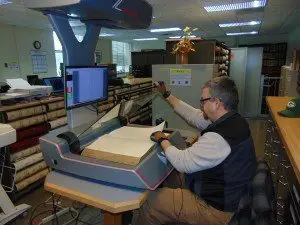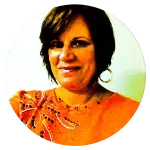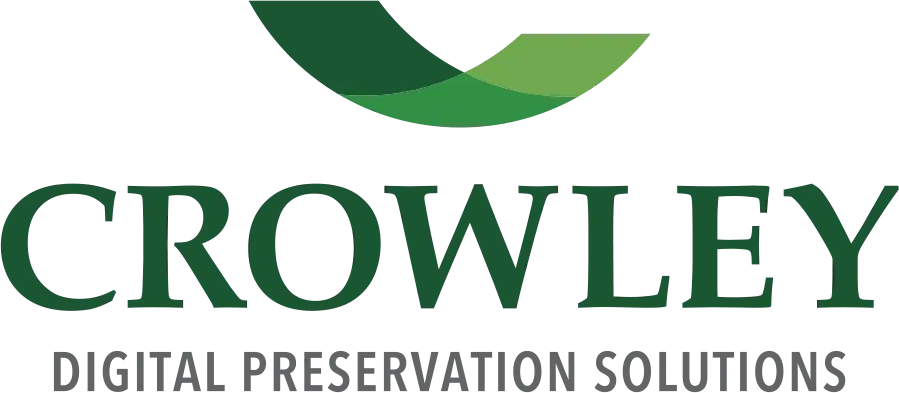Road Scanner, Part Two

Last week, we shared the story of Overland Conversion and their traveling Zeutschel OS 12000 overhead scanner. Weighing in at over 550 pounds when crated and needing a trailer for transport, the 12000-series does not easily fit the category of “portable.” And yet Chris Irelan and his firm have found a way to make quality imaging-on-the-go successful, traveling the states of Iowa, Illinois, Wisconsin, Indiana, Missouri, and Arkansas. Curious about the concept of taking the large format scanner (affectionately nicknamed ‘Z’) on the road, I delved in a little deeper:

Q: You call Overland Conversion a “mobile scanning service.” Do you scan from your vehicle or do you travel and set up on-site?
A: We currently only perform work for county government, which requires strict security standards. With that, we set the equipment up in the location of their choice, normally in their records vault. Plans are in the works to eventually use a fully-equipped trailer to process less sensitive documents for other types of clients.
Q: How did you decide there was a market for mobile scanning? How have you marketed your service and what has the response been?
A: My business partner was already involved in the industry and didn’t like the service that they had been receiving from other contractors. They came up with the idea of putting someone in business that would end up being their sole provider. That someone was me. The response has been extremely positive from all parties. When in our client offices scanning, we become very involved by asking questions about the materials we work with and getting as much clarification as possible to insure that we scan things exactly as the client requires. We invite them to ask questions whenever they want. We make a point to invite the elected office holder and his or her staff to get close so that they can see what we are actually doing with their documents. We often receive compliments on our work ethic, which, unfortunately, hasn’t always been the client experience in previous phases of their digitization.
Q: How long does ‘Z’s set-up typically take?
A: When we first started traveling with ‘Z’, it would take a little over an hour. The clock starts from the time we touch the first box of four scanner components (computer, scan head, neck and base). Setting ‘Z’ up usually consists of unboxing in the trailer, moving everything in by hand, dolly or flatbed cart and then navigating a maze of doors, hallways, research counters and narrow walkways in offices and vaults with the semi-occasional set-up on a second floor or a sub-floor. Now the process has been streamlined down to 30 to 45 minutes.
Q: Is there an average stay on the job?
A: Projects vary. I have had projects that last a few day and others that last up to three months.
Q: Can you give me a few interesting examples of what “Z” has scanned over the years?
A: Overland Conversion is only one year old, but in July we scanned the Recorder’s copies of the George Rogers Clark land grants in southern Indiana. These lands were given as a bounty to the soldiers who served with Clark in the Illinois country during the Revolutionary War. In May, we scanned a promotional image from the early twentieth century for a society working to preserve the memory of Ilasco, Missouri, a cement company town that no longer exists*. We’ve scanned slave deeds in Arkansas, military records from the Civil War to Vietnam and land records of almost every description.
Q: Do you have a project that you would consider “most interesting”?
A: Bob Welch, our other scanner operator, and myself are avid historians. Bob actually has a Ph.D. in history and we both are involved in the hobby of Civil War living history for the past 20-plus years. We find something in every project that sparks our interest, some of which is listed above. We were both taken back, though, when we scanned the discharge of a Civil War veteran whose paper had been signed personally by General Grant’s aide and when we found a recipient of the Navy Cross during WWII that the county we were working in had not known about – or somehow missed their existence.
___________________
Irelan does not have a website or social media pages and doesn’t anticipate the need for such. His work is steady and the customer base secure. When it comes to business, you can’t ask for much more than low overhead (no pun intended), captivating projects and job security.
Editor’s note: Thank you to Chris Irelan for sharing the story of ‘Z’, the traveling Zeutschel. I would be remiss, though, if I did not remind readers that the portable use of this overhead scanner is highly unusual and not recommended. In the case of Overland Conversion, it works because of Irelan’s mechanical and imaging knowledge and his agreement to a special maintenance contract that excludes any damage caused by transportation. For more information about Zeutschel overhead document and book scanners – some of which are much more easily transported – visit our website or call (240) 215-0224.
*If you’re curious about Illaso, Mo., read the book “City of Dust: A Cement Company Town in the Land of Tom Sawyer” by Gregg Andrews
The Crowley Company is a full-solution imaging partner. From micrographics equipment and microfilm to desktop and production scanners to patron systems and conversion services, The Crowley Company has aided records managers, archivists, librarians, researchers, students and others throughout the world with archival preservation, records management and digitization solutions.

